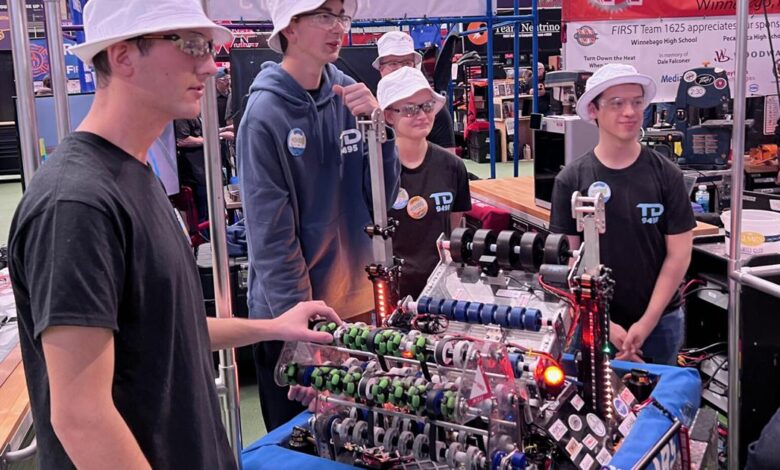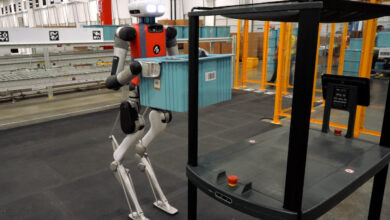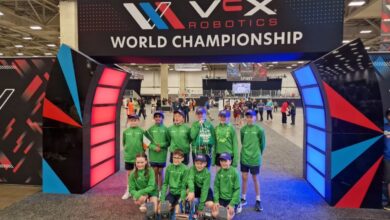An Aurora-based robotics team of just 4 was the first Nebraska team to compete at world championship

For more than 30 years, the FIRST Robotic Competition has challenged international high school teams to build their own robots. Run by nonprofit FIRST, the 10-week competition helps promote and develop STEM skills in students.
Teams get six weeks to design, build and program a robot before they compete in regional competitions. After showing off the robot’s skills in the qualification matches, teams pair-up and form an alliance to compete in the double-elimination playoffs.
Competition winners and the top four teams will then be able to advance to the FRC Worlds Championship.
The championship is held during the four-day FIRST Worlds Championship, which also hosts championships for FIRST’s other competitive divisions; the FIRST Lego League and the FIRST Tech Challenge.
University of Nebraska-Lincoln professor Tami Brown-Brandl said 50,000 people attend the FIRST Worlds Championship, with many Fortune 500 companies looking to watch the competitors.
People are also reading…
Around 600-800 FRC teams end up advancing to the championship. However, this was the first year that a Nebraska team has been able to travel to Worlds.
TechKnow Difficulties #9495 is an FRC team based out of Aurora. According to Brown-Brandl, who is also team’s lead mentor, they are one of three FRC teams based in Nebraska.
The TechKnow Difficulties team look at Juan McKendry’s robot design before getting to work.
Meeting the team
The group has four members; Austin Lents, Thomas Brandl, Ella Curtis and Juan McKendry. Each of the high schoolers had previously participated in robotics before joining TechKnow Difficulties.
Lents had previously participated in a VEX Robotics team in middle school, but the team had to shut down once he entered high school because of a lack of a lead mentor. Lents joined TechKnow Difficulties during his junior year, after Brown-Brandl told him about the team through email.
“We didn’t have an official team last year,” Lents said. “We just kind of had Juan, Thomas and I, and we built a robot but we didn’t compete with it. And then I had a lot of fun so I stayed this year and it’s been — it’s been really great.”
Brandl said that he’s been around robotics since he was 2 years old, starting out on a FIRST Lego League team, which is a robotics league for elementary and middle school students. During Brandl’s sophomore year he joined the unofficial TechKnow Difficulties.
Curtis was also a part of an FLL team, participating in the league for five years. Curtis is the newest member of TechKnow Difficulties.
McKendry had previously competed on a FRC team in 2021 when his family lived in Arkansas. Once McKendry’s family moved to Lincoln at the end of 2022, he found that there weren’t any robotics teams active in Nebraska at the time.
Juan McKendry works with a machine to build the TechKnow Difficulties robot.
“I moved here and got in contact with Tami,” McKendry said. “And we kind of started the team from there.”
TechKnow Difficulties is on the smaller size as an FRC team. According to Brandl, four is the minimum number of members required for a team, though most teams have between 20-60 people.
“A lot of teams have 20 to 60 people (who all) can be doing separate things at the same time,” Brandl said. “But like here, we only have four people, so we’re all working on the same thing at the same time, so it just took a little more time (to complete our robot), but we also did get to do every part unlike some bigger teams.”
While each member did have to work a bit on everything, they also had a designated focus area. Lents is the programmer and drive coach, Brandl is the operator, Curtis helps as the human player and McKendry works as the design lead.
With six weeks to build, the team dedicated a lot of time to working on their robot. According to Brandl, the team met five times a week, working upward of three hours on weeknights and 12 hours on Saturdays.
“Every minute that’s not really spent doing something prior, like school or sports or (other) activities, is spent working” on the robot, Brandl said.
However, the team didn’t think that the workload was too daunting. Curtis said that they had a lot of fun building their robot, which made the workload never feel as hard as it should have been.
“Being a small team, we’re a lot closer than some of the teams that have like 30 to 50 people on them,” Curtis said. “So we’re able to have fun and make like — make it fun and make it not always seem like work.”
Ella Curtis works on a metal plate for the TechKnow Difficulties robot.
Let the games begin
TechKnow Difficulties’ first competition of the season was the Iowa Regional in Cedar Falls, Iowa, on March 20-23.
While Lents, Brandl, and McKendry had attended FRC regional competitions before, this was Curtis’ first time. According to Curtis, FLL competitions run robots on three-by-six-foot tables, while FRC competitions have robots in an area almost the size of a basketball court.
“It’s so much more chaotic and so much more energizing than the FLL competitions,” Curtis said. “Which is really just like — it was awesome for me, honestly, I had so much fun this year and I was not expecting it at all.”
Austin Lents hammers a piece to the TechKnow Difficulties robot.
The event also had a lot of competitors and mentors that were willing to help each other out. According to Brandl, when they had a programming problem with their robot, three mentors from other teams came to help.
Lents said they stayed in contact with one of those mentors, receiving help from them after the competition.
“He helped us for a couple more weeks going into our next competition because their team was done going to competitions for the year,” Lents said. “And so, he helped us sort out some programming issues we were having over call which was super helpful.”
During the Iowa Regional, TechKnow Difficulties played in one playoff match and ranked 25th overall. While getting ranked is important, McKendry said that the first regional competition is more about testing the robot and seeing where it can be improved.
“When I was on my Arkansas team, the first competition of the season was always just let’s learn as much as we can,” McKendry said. “Let’s, like, push the robot as far as I can and learn as much about ourselves and the robot, and then the next competition is where the performance really happens.”
And perform they did, as TechKnow Difficulties next competed at the Oklahoma Regional in Oklahoma City on April 3-6. The team placed sixth overall and competed in two playoff matches.
The team also received the All-Star Rookie Award at the Oklahoma Regional. According to Brown-Brandl, this award is not just given to rookie teams that have a good robot, but also based on how much they help other teams and some outreach done outside of the competition.
Austin Lents, left, and Thomas Brandl look over their robot at a FIRST Robotics Competition.
On top of designing, building and programming a robot, each member has also helped to spread science and technology to others.
One of the major outreaches that the team does is teach a summer camp at the Edgerton Explorit Center in Aurora about the basics of Lego building and the engineering fundamentals. They also run a day camp for the boy scouts at Merit Badge University, where they teach how to build and program an FLL-type robot so they can earn a robotics badge.
The team has also taken their robots to different events in the Aurora community to show off all the cool things it can do.
“We brought the robot to the elementary carnival,” Lents said, “And had, like, a game where the kids try to guess where the projectile is going to land after we shoot it out, and they get (a) prize if they get it right.”
Brandl and Curtis have also been mentoring FLL teams from their middle school, with them taking one of them to a state competition.
McKendry was also trying to increase awareness of robotics at his school, Lincoln Southeast High School, and trying to get his school an FRC team.
Brandl also said that they are working with the Heartland Robotics Cluster, which is a $25 million grant program that helps grow STEM and business in Nebraska and teach camps to help design, fabricate and program FRC robots.
Thomas Brandl works on the TechKnow Difficulties robot before heading to prom.
“Also, we sent letters to our governor, to the Dean of College of Engineering, associate Dean of the College of Engineering (at UNL) and then the department head of Biological Systems Engineering just because we need to expand (FRC) not only here, but throughout the state,” Brandl said.
This team has done a lot. However, the Rookie All-Star Award doesn’t automatically give a team an invitation to the championship.
According to Brown-Brandl, if a top team has already been invited, then a wildcard invite is handed out to the follow-up ranked teams.
Since TechKnow Difficulties ranked sixth, they got the second wild card invite and were able to advance to the FRC Worlds Championship in Houston on April 17-20.
The TechKnow Difficulties team poses for a picture after being awarded the Rookie All-Star Award.
The FIRST Worlds Championship
When asked if they were surprised by the invitation, Lents told his teammates, “Well, I don’t know about you guys, but I personally knew the whole time.”
According to Brown-Brandl, after receiving their invitation, the team looked through the history of the championship and discovered they’re the first Nebraska team to make it.
“We were like, ‘OK, who went to Worlds?’,” Brown-Brandl said. “And we’re like, ‘Oh, and no and no, are you kidding me? We’re the first ones to make it to Worlds!’”
For the FIRST Worlds Championship, each of the leagues are set in a different section of the George R. Brown Convention Center. According to Brandl, the championship had eight fields right next to one another, with different leagues going on at the same time.
Brandl described the Worlds Championship as, “like eight mini-regionals going on at the same time.”
As the official rookie of the team, Curtis thought that the normal competitions were already on a large scale, but worlds was exponentially bigger. Curtis said it was hard to tell what was happening half the time, but that’s what made it fun.
A photo from the FIRST Worlds Championship.
“Our (Brandl and mine’s) FLL team had the opportunity to go to an international competition our last year that we were a team and, honestly, going into Worlds, I was kind of like, ‘Oh, this is going to be similar, it’s going to be kind of on the same scale,’” Curtis said. “But really it’s just like- you- you have no idea what you’re getting yourself into until you get there and just see the sheer amount of people in one section of the building.”
Lents’ favorite part of the competition was getting the chance to talk and compete against many FRC teams. Lents said that it was a bit crazy having followed some of the best teams then getting a chance to play against those same teams.
“There’s so many very good robots there, and you can go around people’s pits and and see them all and ask them about what stuff they do and why they made the decisions they made,” Lents said. “That’s my favorite part at least, is getting to see all these insane teams that have just the craziest robots right in front of your eyes.”
The second floor of the championship is filled with displays from different businesses and Fortune 500 companies such as NASA, Disney, Google, Haas Formula 1 and more. Teams got the opportunity to talk with the businesses and learn more about them.
While this had been McKendry’s third time at the championship, having gone twice with his Arkansas FRC team, he said speaking with the different companies was beneficial.
“As well as meeting all of the teams like Austin and Thomas mentioned, you also meet a lot of people in real engineering industries,” McKendry said. “So it’s really cool to meet (them), especially when you’re considering careers and things like that.”
While TechKnow Difficulties did not get the results they wanted from the championship, as they didn’t get any awards and were unable to make it to playoffs, they still felt they did pretty good.
“We’re just a local team with four people and we went out there and we did play pretty good,” Brandl said.
“Yeah, we held our own, which was pretty cool to see,” Lents said.
“Yeah, we ended up about the middle of our division,” Curtis said. “Which (was) beating out some like fairly good teams that were way bigger and (had) bigger budgets than us.”
Brown-Brandl also thought the team did amazing, especially with the limited time span between the Oklahoma Regional and the Worlds Championship. There were 10 days between the competition, but Brown-Brandl said with other events and travel time got limited to three days.
“They changed some parts of their robot and then they had to reprogram and make sure everything was running and then we went to worlds,” Brown-Brandl said. “So it is really an intense season.”
The TechKnow Difficulties team competes in a match in a FIRST Robotics Competition.
Looking forward to the future
That was the 2024 FRC season for TechKnow Difficulties.
The future of the team is a bit unclear at the moment though, as Lents and McKendry have graduated high school and are heading to college. While the two will be able to act as mentors for other teams, they can no longer compete on the team.
Since the minimum for a team is four people, that means that TechKnow Difficulties needs new members. Brandl even said that priority No. 1 for next season was to find more people because, “Two people is definitely not enough to build a whole robot, even with help from the mentors.”
It’s hard to say whether or not finding new members will be hard. On the one hand, the team is the first Nebraska team to make it to the FRC Worlds Championship, which may interest people into joining. On the other hand, FRC is not as well known in Nebraska.
Currently, including TechKnow Difficulties, there are only three FRC teams currently in the state.
“On one hand it’s cool, cause, yay, we’re the first,” Lents said. “On the other hand, nobody knows really, cause it’s not like we beat 50 teams to the chase, we beat two teams to the chase.”
According to Brown-Brandl, that’s a low number compared to other states, as Iowa has 33 teams, Missouri has 82 teams, with 15 in Kansas City alone, and Michigan has the most teams at 627. While other Nebraska FRC teams have been started in the past, they have struggled to sustain themselves and have died off.
The team is confident that they will be able to find more members for next season. Since they are not associated with any specific school, any high schooler can be a part of the team.
Another reason they can use to get new members is to show that they have competed and have proof of how well they have done.
The TechKnow Difficulties’ robot rests during a competition.
“You know, being on a team that’s actually competitive, that’s much easier to join than a team that is just struggle-lugging along,” Lents said.
The team has also realized that they don’t have to just stick to the Aurora community.
Lents estimated that Aurora has a population of 5,000 with 90 kids graduating. With a small community, Lents said that it’s difficult to get people who are interested and have the time to commit to FRC.
However, McKendry lives in Lincoln, but he was willing to drive to Aurora on weekends and video chat on weekdays to participate on TechKnow Difficulties. There are bound to be other people.
“We don’t need that many people technically,” Lents said. “Like, obviously, lots of people would be awesome, but I’m confident — I’m fairly confident that, from reaching out to places like Central City and Grand Island, we can find enough people who would be interested and invested and aren’t busy with other things.”
Brandl believes to join FRC, people don’t have to be smart, or at the top of their class, they just need to be curious and dedicated to learning. Brandl even cites Lents as an example of that principle, since he didn’t know anything about FRC specifics before joining.
“He came in with no knowledge of, like, building a robot, or, I guess, a little bit from VEX,” Brandl said. “But in a few weeks, we taught him everything, really, he needed to know and now he’s vital to the team.”
McKendry added that the reason FRC is impactful is because it always creates a learning opportunity, both in engineering and outside of it. McKendry said that the reason companies like NASA, Lockheed Martin and others are interested in the competition is because it creates people who have had to learn the skills needed for their work.
“I was still learning,” McKendry said. “Four years I’ve been doing this and I was still learning just as much as Day 1.”
Brown-Brandl has even compared the FRC kids to her college students, stating that she wished they had skills that the teams learn.
“The seniors in college know a lot of math and they know how to calculate a lot of things,” Brown-Brandl said. “But so many of them do not have — they have no experience like this experience. The kids out of FRC understand how to design, build, and program things to work.”
While it’s not thought about during the season, Lents thinks that regular high school kids being able to create a robot is really remarkable and pretty empowering.
“It’s not about what you come onto the scene with,” Lents said. “It’s about what you take out of it.”
From left, Austin Lents, Thomas Brandl, Ella Curtis and Juan McKendry stand around their robot during a FIRST Robotics Competition.
Everyone will just have to wait and see if these kids can make it to the FIRST Worlds Championship again in 2025.
“If this little four-person team in Aurora, Nebraska, can make it to Worlds,” Lents said, “these Lincoln and Omaha schools don’t have excuses to not have teams.”
During recent military drills with Cambodia, China’s military showed off a robot dog with an automatic rifle mounted on its back. CNN’s Mike Valerio reports.



